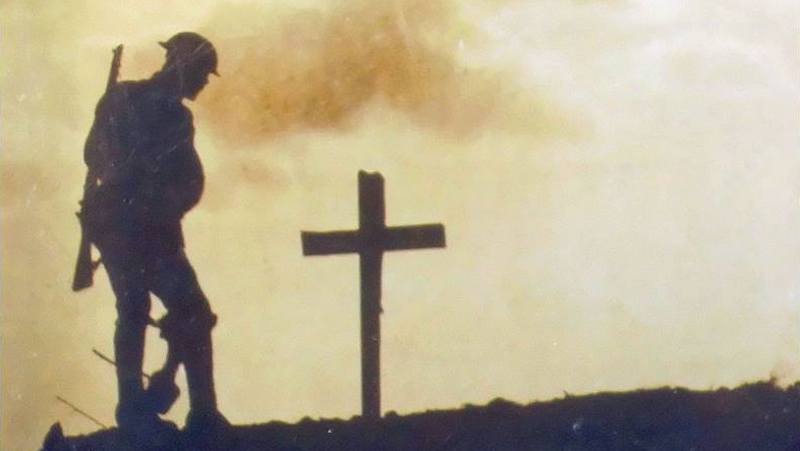
Yesterday marked a century since the guns finally fell silent on the Western Front. For over four years “the war to end all wars” turned Europe into a trench-scarred theater of bloodshed, directly claiming the lives of nine million soldiers and seven million civilians, and altering the world’s perception of warfare and “noble sacrifice” forever.
The ten novels below—some written by participants in and observers of the Great War, others by descendants of those who fought—depict the hellish squalor of life in the trenches; the significance of the fraternal bonds forged therein; the agony of the shellshocked returning soldier; the cruel, often bleakly comic, nature of the military chain of command; and the desire to extract meaning and solace from the chaos of the time.
*

The Return of the Soldier by Rebecca West (1918)
Through this evening of sentences cut short because their completed meaning was always sorrow, of normal life dissolved to tears, the chords of Beethoven sounded serenely.
“Her debut novel, The Return of the Soldier, is a wonderful provocation. The story revolves around a 36-year-old soldier called Chris Baldry who has returned from the front during the first world war physically intact but shell-shocked. He has forgotten the past 15 years of his life and can’t remember anything past the age of 21…He has forgotten the war. He is, as a result of this loss, much happier.
Reading today, this memory loss feels like a convenient plot device. But as Victoria Glendinning reminds us in the introduction to the Virago anniversary edition of the novel, problems with recollection were a frequent symptom of shell shock. By the end of the first world war, the British army faced 80,000 cases, with hundreds of thousands more young men also dealing with serious trauma. So in 1918, West was engaged with some of the toughest questions of the time.
The Return of the Soldier is more about the pity than the glory of war; references to ‘flooded’ trenches, a sky ‘full of flying death’ and bullets falling ‘like rain on the rotting faces of the dead’ show that West has no illusions about ‘the old Lie.’ But The Return of the Soldier is not a straightforward anti-war book. One of its most tragic implications is that Chris is better off ‘sick’—he may be delusional, but his madness makes far more sense than the real world.
…
“On the way to [the] unsettling conclusion, West packs in all manner of subversion. There are hints of lesbianism and adultery, as well as the eternal taboo of incest. She undermines the idea that women should exist merely to promote men’s happiness … And so it goes on, blasting assumptions old and new. And West carried out this work of destruction at the age of just 24 and in less than 200 pages. If that isn’t formidable, tell me what is.”
–Sam Jordison, The Guardian, June 5, 2018
*
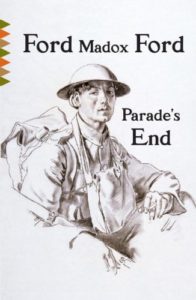
The Parade’s End Tetralogy by Ford Madox Ford (1924-28)
The war had made a man of him! It had coarsened him and hardened him. There was no other way to look at it. It had made him reach a point at which he would no longer stand unbearable things.
“The middle two volumes of the novel are spent at the western front. Other, more conventional novelists might have set the madness of war against the calm and balm of love and sex; Ford knows more and sees deeper. War and sexual passion are not opposites: they are in the same business, two parts of the same pincer attack on the sanity of the individual. It is not at first obvious how saturated Parade’s End is with sex—with memories of it, hopes for it, and rumours about it. (The novel is masterly on the workings of gossip, and the way it gets poisonously out of hand. By the fourth volume, the rumours about the Tietjens brothers have grown to the point where the pair of them are viewed as ‘notorious libertines’ and Mark said to be dying of syphilis. The objective reader can count up the number of women the brothers appear to have slept with in their entire lives: three between the two of them.) The central emotional and sexual vortex is that involving Sylvia, Christopher and Valentine. But the lives of lesser characters, even those who are specks at the periphery of the reader’s vision, are also endlessly disrupted and twisted by sex. There is O Nine Morgan, who applies for home leave because his wife is having an affair with a prize-fighter; Tietjens, having heard that the boxer will kill Morgan if he turns up in Wales, refuses the request. So, instead of being beaten to death, O Nine is blown to bits in the trenches: sex gets him either way. Elsewhere, sergeants’ wives take up with Belgians; a cook ruins his career by going awol because of his ‘sister’; an RSM wants a commission because the ‘bad boys’ who ‘monkey’ with his wild daughter back home will be more careful if she’s an officer’s daughter; while Captain McKechnie keeps getting home leave to divorce, and then not divorcing (‘That’s modernism,’ growls General Campion). Sylvia’s brusque view of the military is that ‘You went to war when you desired to rape innumerable women.’ She regards the war as an agapemone (a place where free love is practised), and as ‘an immense warlock’s carnival of appetites, lusts, ebrieties’…
…
“Few novelists have better understood and conveyed the overworkings of the hysterical brain, the underworkings of the damaged brain (after his first spell at the front, Tietjens returns with partial memory loss), the slippings and slidings of the mind at the end of its tether, with all its breakings-in and breakings-off.”
–Julian Barnes, The Guardian, August 24, 2012
*
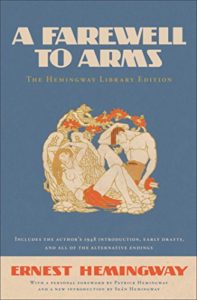
A Farewell to Arms by Ernest Hemingway (1929)
The world breaks every one and afterward many are strong at the broken places.
“There is in A Farewell to Arms no change from the narrative method of The Sun Also Rises and Men Without Women. Ernest Hemingway did not invent the method, which is chiefly to be characterized by the staccato nature of sentences (an effort at reproducing universal conversational habit), and its rigid exclusion of all but the most necessary description. Yet if Hemingway was not the inventor of the method, tentative gropings toward such a manner having been made by many of his immediate predecessors, the author of A Farewell to Arms has, in his several books, made it so strikingly his own that it may bear his name, and is likely to henceforward. The method has its advantages, and also its disadvantages.
The chief result is a sort of enamel lustre imparted to the story as a whole, not precisely an iridescence, but a white light, rather, that pales and flashes, but never warms. And because it never warms, or never seems to warm, the really human in Hemingway (and there is a great deal in Hemingway that is human) fails of its due. It is not impossible that Ernest Hemingway has developed his style to the extreme to which he carries it because in it he finds a sort of protective covering for a nature more sensitive than he would have one know.
…
“There will be debate as to whether A Farewell to Arms is a finer piece of work than The Sun Also Rises. And there will be cogent arguments advanced on either side. On the surface, the newer story is more effective than the earlier novel. There is more drama, the movement is more nearly continuous and better sustained. And the story of the love between the English nurse and the American ambulance officer, as hapless as that of Romeo and Juliet, is a high achievement in what might be termed the new romanticism. And yet for the present reviewer The Sun Also Rises touches a note which Hemingway caught once, and, in the very nature of the thing, cannot touch again.”
–Percy Hutchison, The New York Times, September 29, 1929
*
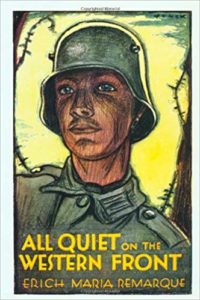
All Quiet on the Western Front by Erich Maria Remarque (1929)
I am young, I am twenty years old; yet I know nothing of life but despair, death, fear, and fatuous superficiality cast over an abyss of sorrow. I see how peoples are set against one another, and in silence, unknowingly, foolishly, obediently, innocently slay one another.
“The sense, less of being uprooted than of never possessing roots, is the governing motif of the book, the tragedy that Paul Bäumer and all his fellows instantly recognized and that has proved itself in the ten years since the war. Here are boys bewildered not only by war, but also by lacking standards to which they can revert in a psychological escape from war. Here are those whom Gertrude Stein indicated as a ‘lost generation.’
…
“In All Quiet we have a picture of that physical horror unsurpassed for vividness, for reality, for convincingness, which lives and spreads and grows until every atom of us is at the Front, seeing, mingling, suffering. For us readers, indeed, the picture finally acquires a kind of fascination; it so rivets our senses that it no longer terrorizes our imaginations. Under such a spell we can take in everything and need run away, psychologically, from nothing.
…
“There is one further quality about All Quiet in addiction to its magnificent physical picture of war and its burden of a lost generation, and that is its humanity. It is an objective book, and ironic book, but it is never callous, never hard-boiled, never unfeeling.”
–Louis Kronenberger, The New York Times, June 2, 1929
*
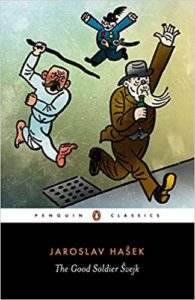
The Good Soldier Švejk by Jaroslav Hašek (1930)
After debauches and orgies there always follows the moral hangover.
“Of the novels that directly concern the war, only one among the first rank is a satire (unless one counts portions of Louis-Ferdinand Céline’s Journey to the End of the Night ), not only of the war itself, but of official society as a whole. That is The Good Soldier Švejk…The central character in the novel, Josef Švejk, a dealer in stolen dogs in civilian life, is a Czech soldier who makes himself appear a fool to get around his superiors and fights a peculiar and often hilarious war of attrition against the difficult circumstances he finds himself in.
…
“The novel is one of the classics of 20th century literature. The German poet and playwright Bertolt Brecht praised the novel highly and adapted it into a play set during the Second World War. American author Joseph Heller is rumored to have said he would not have written his novel Catch-22 if it not for reading Švejk.
The novel was so influential that variations of the word ‘švejk’ were adapted in the Czech lexicon to indicate idiocy and military absurdity. Nationalists and right-wingers throughout Europe despised the work, and by 1925 it was already banned in the Czech military, while the Nazis later publicly burned the German translation.
…
“The Good Soldier Švejk is a work that ought to be widely read. In it Hašek comically and ironically distilled the experience of the oppressed derived from great historical events, which led to a vehement opposition to patriotism, bureaucratic careerism and authoritarianism. Its truths are perhaps more necessary than ever.”
–Isaac Finn, WSWS, April 14, 2015
*
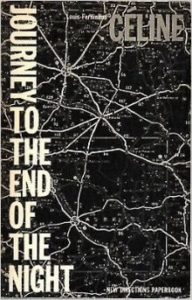
Journey to the End of the Night by Louis-Ferdinand Céline (1932)
The sadness of the world has different ways of getting to people,
but it seems to succeed almost every time.
“…on reading Céline’s notoriously emetic novel, you could be forgiven for wiping down your lapels and observing that not more than a twelfth of it is actually set in that hellish conflagration. Further, Céline’s war is not the familiar, muddy charnel house sketched by Remarque or the British war poets but a free-form affair, characterized by delirious mobility, the garish illumination of burning villages and chance encounters between renegade and cowardly combatants. It is a Goya etching animated in the style of a Tom and Jerry cartoon.
Yet Journey to the End of the Night is first and foremost a World War I novel. Just as much as it is infected with the St. Vitus’ dance of modernity, so it also suppurates with the fear of violent death … It’s this paranoia, along with Céline’s trademark scattering of ellipses, that dominates Journey. Darkness has fallen over the face of the world, and the only escape is not dawn but death.
…
“Journey burst like a bombshell on the Parisian literary scene, garnering huge sales and almost winning the Prix Goncourt. Yet no accolades could assuage Céline’s survivor guilt, or the bitterness it had engendered—a bitterness that curdled, becoming specific and prosaic, rather than universal and poetic.
Perhaps it’s wrong to read back into the text the events that later befell its author, but the facts remain that after writing two vilely anti-Semitic pamphlets in the late 1930’s, following the Liberation he went into exile, first in Germany and then in Denmark. He was tried for collaboration and sentenced to a year’s imprisonment in his absence, and—a particularly Gallic touch this—declared ‘a disgrace’ to la patrie. It wasn’t until the late 1950’s that he had any kind of rehabilitation in France. When those tyro American emeticists William Burroughs and Allen Ginsberg went to visit him in Paris, they found a crazy old man who was terrified that his neighbors were trying to poison his numerous cats.
…
“This is the novel, perhaps more than any other, that inspired me to write fiction. Céline showed me that it was possible to convey things that had heretofore seemed inaccessible. Specifically, he showed how to yoke the equine demands of the body to the golden cart of fantasy, to create a form of dirty magic realism. When the novel first appeared, it was still possible to believe in the avant-garde: there were important things to be said, things suppressed by taboo and prejudice. Now, everything is permitted and nothing is heard. Yet, despite this, Céline’s voice still sounds out: bullying, loud, pathetic, craven and ultimately, I feel, triumphant.”
–Will Self, The New York Times Book Review, September 10, 2006
*
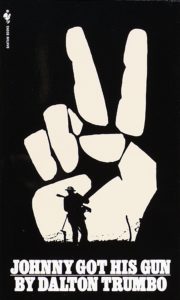
Johnny Got His Gun by Dalton Trumbo (1938)
Did anybody ever come back from the dead any single one of the millions who got killed did any one of them ever come back and say by god i’m glad i’m dead because death is always better than dishonor?
“The man who wrote Washington Jitters adds another string to his longbow with a book which is so extreme, and so gruesome, that it will be difficult to sell. But there is some fine writing, some very moving moments, and the sensational elements of the situation are often counterbalanced by the sobriety of the handling. The book is the day by day emotional record of a man, so mutilated, so close to death, that he can best appraise the sacrifice of war. Having lost arms, legs, and facial surfaces, he is isolated from the outer world. Day by day he reconstructs the past, attempts to establish some contact with the nurses, the doctors, but once having done so, he is ignored and sent back to his living death. Based on a medical clipping, it is nonetheless a flamboyant fictional theme, and difficult to carry.”
–Kirkus Reviews, September 7, 1939
*
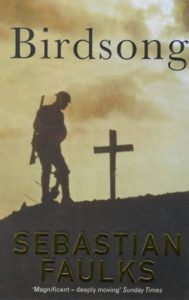
Birdsong by Sebastian Faulks (1993)
I know. I was there. I saw the great void in your soul, and you saw mine.
“All the best parts of Birdsong are set not so much in the trenches as beneath them—in the network of tunnels with which both the British and the Germans laced the no man’s land between their lines. Packed with explosives and then blown, these tunnels, like most of the tactics in World War I, consumed a great many lives to little purpose. For both sides were often digging in the same direction, producing an underground game of cat and mouse, in which they would try to locate and booby-trap each other’s work before their own was discovered.
So long as Mr. Faulks keeps his head down, as it were, Birdsong seems to me superb. His prose is spare and precise: ‘Jack Firebrace lay 45 feet underground with several hundred thousand tons of France above his face. . . . Jack kept sticking the spade into the earth ahead of him, hacking it out as though he hated it.’ His idea of using the scenes in the tunnels—’fireballs of earth and chalk’—is something new in the annals of this much-covered combat … It is as if Mr. Faulks had bled his own prose white, draining it of emotion in order to capture the endless enervating slog of war.
…
“…the English are like crackheads when it comes to their own past. But the most important of the novels to have done that have been revisionary, and have encouraged a kind of skepticism about the whole enterprise and possibility of recovering that past.
Birdsong is very different. Mr. Faulks does not, of course, try to present trench warfare as a meaningful endeavor. But he does try to say something else, something consoling: the past can be recovered, its code can be broken; it can be used to add meaning to contemporary life. Its limitations can be overcome and its promises fulfilled because we know it can heal. In other hands that message could be powerful, and I suspect that it has in any case contributed to the novel’s considerable popular and critical success in England. But for me Mr. Faulks’s elaborate structure merely demonstrates how quickly innovation can be reduced to a formula. The present-day scenes in Birdsong are so lackluster that they seem a kind of injustice; I can scarcely believe they’re the work of the same writer who in this book’s best pages draws on Owen’s great poem to provide a genuinely cathartic description of the war’s last days.”
–Michael Gorra, The New York Times, February 11, 1996
*
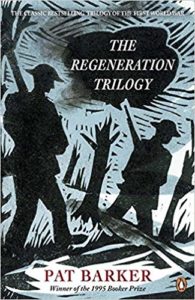
The Regeneration Trilogy by Pat Barker (1991-95)
Ghosts everywhere. Even the living were only ghosts in the making.
You learned to ration your commitment to them
“The core of the subject was the meetings that took place in 1917 between Siegfried Sassoon, Robert Graves, Wilfred Owen, and the psychiatrist/anthropologist W.H.R. Rivers, recorded in several autobiographies. But she has branched out imaginatively around this factual core in a number of ways. Courage and its limits, love between males both Platonic and erotic, the nature of therapeutic healing, and—because of the appalling nature of that particular war—the brutality of dying and the tenuousness of any counterbalance to it, the themes unfold gradually throughout the three books.
…
“Rivers’s role as diffident healer is, in a low-key way, a central point of sanity in the chaos of war. Perhaps Barker wants to show that the twentieth century, having invented war in its ultimately horrible form, also produced a new way of accepting mental suffering.
…
“Barker’s is, however, not some chronicle of triumph over terrible odds—and in the last volume, The Ghost Road, the picture darkens even more. It is a book haunted by ghosts—those who have actually died and those, in Owen’s words, ‘whose minds the Dead have ravished.’ They make a silent, reproachful, always growing population throughout the trilogy.
…
“Truthfulness is in itself a glimmer of light. Virginia Woolf, in 1917, reviewed Sassoon’s war poems. He makes us feel, she says, the most sordid and horrible experiences in the world as no other poet of the war has done. ‘It is realism of the right, of the poetic kind.’ In just that way Pat Barker has recreated in terrible and enlightening shape one of the great formative events of the century. My father won medals in that war, but never told me anything about it. Barker has now done it for him.”
–Rosemary Dinnage, The New York Review of Books, February 15, 1996
*
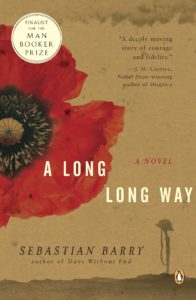
A Long Long Way by Sebastian Barry (2005)
It had been a war of kingly poisons, in the air, in the memory, in the blood.
“The intimate brutality of life in the trenches is evoked in visceral detail, from the stench of raw terror to the sensation of walking on a ‘foul carpet of crushed dead’. In this landscape of death, all the normal associations of domestic and natural life are horribly mangled and imbued with a macabre grace: gas folds over the trench like a bedspread and a kingfisher shoots along the river bank like a ‘glistening blue bullet’
The poetic quality of Barry’s writing, in which a description of the arrival of winter comes with three dazzling similes, may initially seem to add a layer of inappropriate luxury and beauty to the bleak subject matter, but it serves a deeper purpose here, reflecting Willie’s faltering understanding of the war.
As the political and moral ground slides beneath his feet and the Irish soldiers are simultaneously despised by nationalists as traitors and denounced by the English as mutineers, Willie clutches at familiar symbols in a desperate attempt to bridge the gap between the world he knows and the one he has stumbled into.
The great achievement of this novel is the restraint with which Barry allows the awful complexity of Willie’s situation to dawn on him.
…
“The title of this novel comes from the popular First World War song—’It’s a long, long way to Tipperary/ But my heart’s right there!’—which presents one view of the Irish soldier’s relationship to his native land. Willie Dunne’s story, his ‘scrap of a song’, offers another perspective, one in which the only place that feels like home is a bomb-scuffed trench and the only people who really comprehend the hollowness of the heart are those who have lived it too. With disarming lyricism, Barry’s novel leads the reader into a hellish no-man’s-land, where the true madness of war can only be felt and understood rather than said.”
–Laura Barber, The Observer, April 3, 2005

